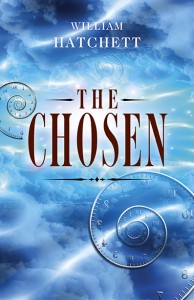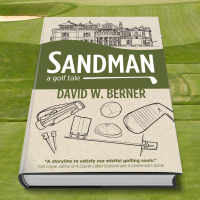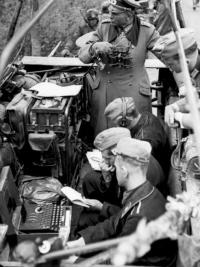
Q and A interview with William Hatchett, author of the Chosen, Cosmic Egg Books
 Can you tell us something about yourself?
Can you tell us something about yourself?
William: I’m a journalist – editor of a specialised, professional magazine called Environmental Health News. I was born in 1958. I live in a leafy suburb of south-east London. I have two delightful grandsons thanks to my lovely daughter, Karina, who exhaust me but give me a lot of pleasure. The book is dedicated to my oldest grandson, AJ. Apart from hanging out with my grandsons, I like canoeing – I’ve built two canoes now – and playing the guitar. I write and self-publish, on my blog, quite a lot of poetry, a hobby really, and I write songs.
I’ve written three other novels, which can be described as historical, retro-espionage thrillers, two of which, the Austin Endicott novels, can be found on Amazon, as well as three full-length plays, one book of sonnets and four books on English social history in the nineteenth and twentieth-centuries. Professionally, I’ve written on topics like housing, social work, local government and environmental health. These subjects interest me a lot and some of the knowledge I have of them is contained in The Chosen.
Could you explain how The Chosen was written?
William: Surely. It evolved from a short story that I wrote when I was at university. The year would have been 1979 and this was in North Wales, where I was studying English literature. Reading HG Wells’ books, including The Time Machine, had been my way into the novel when I was at primary school and the story was a pastiche of one of his ‘scientific romances’. It was called Professor Sidgwick’s Balls. I did not finish it. The typescript lay in a tin trunk for the next 20 years. Flash forward to 2000, I’ve just moved into a new house in south London. It’s a fresh start. I decide to write a novel. The task takes up the next two years.
What emerged still bore traces of Wells’ influence but it was no longer intended as a parody. The story evolved as I went along. I did not plan it before I started. About halfway through, came a Eureka moment. I realised, suddenly, that there was unifying theme and that this could make the novel viable. From there until I reached the end, I was quite excited.
So what is the unifying theme?
William: The main one is theosophy
What’s that?
William: Well, it became popular in the western world at the end of the nineteenth-century – its wellsprings came from eastern religions, including Hinduism and Buddhism. In the west, theosophy appeared to offer an alternative to the forms of Judaeo-Christian religion that Darwin and Marx had killed helped to kill off from the middle of the nineteenth century. Essentially, it was a universal belief system, combining science, philosophy, theology and religion with a touch of the occult, ritualistic aspects of Freemasonry and the Hermetic Order of the Golden Dawn. Theosophy flourished at the twilight of the nineteenth-century – a time when people were increasingly interested in the occult and spiritualism.
The person most credited with reviving theosophy from its pre-medieval origins was a Russian, Helena Blavatsky (who appears, thinly-disguised, in my novel). Madame Blavatsky lived from 1831 to 1891 and was the author of theosophy’s bible, The Secret Doctrine. Theosophy was exciting. It came with a whiff of incense. It was esoteric, mystical, animistic (seeing divinity in nature) and syncretic (combining many other belief systems).
The basic idea of theosophy (the Theosophical Society, founded in 1875, still exists) is that there is no individual salvation or damnation; that the human race is evolving as a whole towards a higher consciousness – a spiritual version of social Darwinism. Some individuals, avatars, are already highly-evolved. They are known collectively as The Great White Brotherhood or Great White Lodge – an unfortunate terminology. Their role is to teach the rest of us. They are gurus if you like. Initiates of the ‘secret doctrine’ and its offshoots soon appeared – men such as George Gurdjieff and Jiddu Krishnamurti. In a secular world, longing for mysticism, they gathered thousands of followers and became very powerful individuals.
Are there any other influences?
William: Yes, lots. I wanted this to be a utopian novel. I am an optimist and I believe that it’s possible that the future will be good. The Chosen is influence by Thomas More’s Utopia (More is the grandfather of the genre), by William Morris’s medieval fantasy, News from Nowhere, by Edward Bellamy’s Looking Backwards (once a best-seller, set in 1883 and imagining the year 2000) by Ebenezer Howard’s Garden Cities of Tomorrow (which popularised the concepts of town planning and the garden city), by the socialist novel Merrie England by Robert Blatchford and by the satires of Jonathon Swift.
Many of my literary models (Wells, Morris, Bellamy, Blatchford) are late-Victorian or Edwardian and, for at least some of their lives, were socialists. I like that period and the transit and purchase of its ideas. I’ve written history books, but that’s another story.
The Chosen is a first-person book and, like a modern console game, a ‘walk-through’. It’s not interactive like a computer game, but proceeds in episodes, presenting a series of puzzles and challenges. I would love the story to exist in game format one day. Of the figures named above, I managed to include William Morris as a character. He is one of the initiates who can travel backwards and forwards in time, with a mission to save the world. Other historical figures who appear in the novel are Karl Marx, Jack the Ripper, Joseph Stalin and Timothy Leary.
Years ago I had a print on my wall. It showed the Roman army fighting Druids wearing black robes, some female, on the island of Anglesey in AD 61 – a scene described by the Roman historian Tacitus. The image fascinated me and led me to researching the history, religion and society of the Celts. In some ways, the purpose of The Chosen is to give a context to that scene. Another strong influence is one of my favourite books, Lempriere’s Classical Dictionary, which was handed down from my father (he used it for crossword puzzles). Published in the late eighteenth century, it’s a textbook of the bible and of Greek and Roman mythology and confidently gives a date to the creation of the world – 4004 BC. It’s a great book and I find that ontological certainty fascinating and appealing.
Would you say that the book is autobiographical?
William: Yes. They say that all first novels are and The Chosen was my first attempt at a long fiction. The character called Frederick who appears in chapter one is, in many aspects like me in my early 20s – nerdy, bookish, not very heroic, awkward with women. The book charts my intellectual and romantic journey. I began it when I was studying English literature living in small town in North Wales called Bangor. It was a backwoods kind of place up in the mountains. I was a hippy with, from my second year at university, to my enormous fortune, a French hippy girl friend.
The town had many bookshops and junkshops. I bought lots of Victorian books, which I still have, and these and the unmistakable aromas of patchouli oil, roll-ups and damp (it was always raining in Bangor) provide the ambience of the opening chapters.
A rock band is quite important to the second half of the story. As to music, well, since my teens I have messed around with guitars and played in bands (with enthusiasm but little success). I still do.
What genre would you place the book in?
William: That’s a hard question. Obviously, I could say that it’s science fiction, because it uses time travel as a plot device. And fantasy, or sword and sorcery, because some of it happens in an imagined Celtic world with helmets and animal skins (though not rippling torsos and homo-eroticism, like Robert E Howard’s books). It could be labelled as ‘steampunk’ since my time machine is built using brass and mahogany in 1879, or as an ‘alternate history’ (these two genres, now popular, hardly existed when I typed up my story about Professor Sidgwick back in 1979), or as a post-modern metanarrative in the way that it uses time fluidly and does not discriminate between the fictional and the real in its construction of a story. However, who cares? I don’t think that genre is important, other than as a marketing device. If people say that the book spins a good yarn, that they find its characters plausible and ideas interesting, I’ll be happy. Nothing else matters really.
Do you have plans for future novels?
William: Yes. The Chosen begins in Victorian England, but the story could equally have been set in any historical period. My characters and the premise could easily be translated into other settings. I have a sketchy idea that the next book in the Frederick Frater series will include a journey to the island of Atlantis and explain how the famous library in Alexandria burned down. I’m fascinated by the concept of hyperboria, ‘the land beyond the north wind’ as described by Plato. The Nazi’s Ahnenerbe exhibition to Tibet, seeking to establish a link between the hyperborian and Ayrian races, interests me and I have a feeling that this will be included somewhere in the mix. Hollowed out mountains, underground cities, Nazis, flying saucers … they’re all lodged somewhere in my brain waiting to come out. I have been planning a scene in which Gurdjieff meets Kierkegaard and they talk of religion and mysticism.Frederick, his family and his complicated love triangle will, of course, be at the centre of the story.
Author’s website http://www.willliamhatchett.com/
BOOK DETAILS
- eBook £4.99 || $7.99
- Aug 29, 2014. 978-1-78279-642-8.
- BUY | AMAZON US | AMAZON UK
- Paperback £10.99 || $18.95
- Aug 29, 2014. 978-1-78279-643-5.
- BUY | AMAZON US | AMAZON UK
Categories:
0 comments on this article







